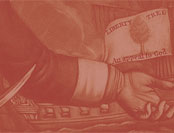


New England
Slavery and the Slave Trade in Rhode Island
The Brown Family
and the Slave Trade:
The Voyage of the Sally
> Anti-Slavery
The anti-slavery movement in Rhode Island spread nearly simultaneously with slavery itself. It was pronounced in some quarters—particularly among Quakers and New Lights (the evangelical Protestants inspired by the Great Awakening of the 1740s and its aftershocks). It was more subtly expressed in other quarters, from the mercantile elite (many of whom, including three of the four Brown brothers, came to disapprove of the slave trade) to political leaders, particularly those eager to establish the primacy of Providence over Newport and Bristol (more closely tied to the trade). [17]
One of the first works of Americana ever purchased by a member of the Brown family was a book by New England’s first abolitionist, Samuel Sewall. [18] Other Rhode Islanders, including prominent clergymen like Samuel Hopkins [19] and Ezra Stiles, were in the vanguard of American anti-slavery activity, and exerted influence far from Rhode Island’s shores. Nor did their attacks end with the nominal end of slavery in Rhode Island in 1784. James Tallmadge of the Brown University class of 1798 authored the amendment that led to the Missouri Compromise and the great national debate over slavery it occasioned.

![[17] Providence Abolition Society](../Images/Thumbnails/Item17_thumb.jpg) |
[17] Providence Abolition Society larger view
At the General Assembly of the Governor and Company of the State of Rhode-Island and Providence-Plantations, begun and held by adjournment at Newport . . . on Monday, the seventh day of June [1790]. (Providence: John Carter, 1790). This act marked the official incorporation of the Society, the full title of which was The Providence Society for promoting the Abolition of Slavery, for the Relief of Persons unlawfully held in Bondage, and for improving the Condition of the African Race. David Howell, the first member of the Society here named (and its president), had been affiliated with the College of Rhode Island since its establishment, serving as tutor, professor, and fellow. |
![[18] Early Anti-Slavery](../Images/Thumbnails/Item18_thumb.jpg) |
[18] Early Anti-Slavery larger view
Samuel Sewall. Phaenomena quaedam apocalyptica ad aspectum novi orbis configurata. Or, Some few lines towards a description of the new heaven as it makes to those who stand upon the new earth. (Boston: Bartholomew Green, 1727). This small volume, purchased in 1769 by Nicholas Brown, may be the first work of Americana owned by a member of the family. Sewall, who inscribed this copy, was a Massachusetts judge who emigrated to America from England as a child. He achieved notoriety as a judge in the Salem witch trials in 1692, but later atoned for his role, and emerged as a leading advocate of beliefs that were tolerant by the standard of the time. In particular, he was a very early opponent of slavery and his celebrated pamphlet prophesied the establishment of a New Jerusalem planted on New England shores. Sewall was also a prominent early Rhode Island landowner—Point Judith, near Narragansett, was named after his wife’s mother. |
![[19] Religious Opposition](../Images/Thumbnails/Item19_thumb.jpg) |
[19] Religious Opposition larger view
Samuel Hopkins. A dialogue, concerning the slavery of the Africans; shewing it to be the duty and interest of the American colonies to emancipate all their African slaves: with an address to the owners of such slaves. (Norwich [Conn.]: Judah P. Spooner, 1776). In 1776, the year of American independence, two powerful tracts against the slave trade were published by Rhode Island intellectuals. Samuel Hopkins (1721–1803) was one of the most distinguished theologians of the late eighteenth century, despite a poor reputation as a preacher (William Ellery Channing said that “he was the very ideal of bad delivery”). A graduate of Yale College (1741), he lived and studied with his mentor, Jonathan Edwards, before accepting a post in what is now Great Barrington, Massachusetts. In 1770 he took a position at Newport’s First Congregational Church. His deep interest in the philosophy of disinterested benevolence led him to oppose slavery and the slave trade—a courageous position in a town where much wealth stemmed from the trade. Hopkins was one of the startlingly few Americans at the time to argue that it was hypocritical to argue against the “slavery” of British taxation while practicing real slavery at home. Even further, he argued that the turmoil of the Revolution was divine justice for a people who had not resolved their internal contradictions. |